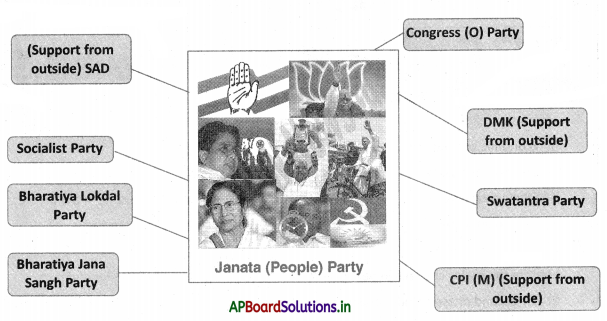Students can go through AP State Board 10th Class Social Studies Notes Chapter 19 Emerging Political Trends 1977 to 2000 to understand and remember the concept easily.
AP State Board Syllabus 10th Class Social Studies Notes Chapter 19 Emerging Political Trends 1977 to 2000
→ The period between 1975 to 1985 was a testing time for Indian Democracy.
→ When the 1977 elections were announced, Indira released all political prisoners and removed censorship on freedom of movement, campaigns, and meetings.
→ All opposition parties merged to form Janata Party.
→ Janata Party became victorious and dismissed nine state governments that enjoyed a majority belonged to Congress.
→ The factional struggle in Janata Party soon culminated in the fall of the government within three years.
→ The Congress returned to power in 1980 and paid back Janata Party by dismissing nine non-Congress state governments.
→ There were different strands of the demands for autonomy in Andhra Pradesh, Assam, and Punjab.
→ The frequent change of Chief Ministers by the central Congress leadership made people believe they are not respected.
→ Popular film actor N.T. Ramarao set up Telugu Desam Party on the plank of the honor and self-respect of the Telugu-speaking people and swept the 1982 elections.
→ The Assamese-speaking people faced difficulties with the officialdom of Bengalis and the flooding of Bangladeshis.
→ In the 1970s, a social movement came out under the leadership of the All Assam Students Union (AASU).
![]()
→ There were talks between agitations and the central government for 3 years and reached an agreement.
→ When elections were conducted Assam Gana Parishad, an offshoot of AASU came to power.
→ In Punjab also there is agitation stating their state was ignored, more powers to states through a constitutional amendment, greater decentralization as their demands.
→ Bhindranwale, leader of militant Sikhs preached separatism and a special state Khalistan was demanded.
→ They occupied Golden Temple and the army vacated them.
→ A fallout of all this was the assassination of Indira.
→ Late Rajiv made an agreement with Langowali of Sikh SAD.
→ Rajiv liberalized system, hoped the participation of the masses, brought the telecom revolution.
→ Communalism sprang during this time through the demolition of Babri Masjid and try to build Ram Temple at Ayodhya.
→ This was the beginning of successful coalitions at the center.
→ Mandal Commission provided for Other Backward Class reservations and globalization are of this period.
→ Regional aspiratIons: Regions agitating for separate statehood, local parties In power, greater shares in revenue and waters, etc., more decentralization.
![]()
→ Coalition: A government formed by two or more political parties governments working together.
→ Communalism: A strong sense of religious belonging that leads to extreme behavior or violence to others.
→ Majority: The amount by which the greater number of votes is cast, as In an election, exceéds the total number of remaining votes.
→ Minority: A group or party having fewer than a controlling number of votes.
→ Single party A democratic country where all the elections were won over democracy by a single political party decimating all others.
→ Outsiders : (In this context) The Assamese people called the Bengalis, migrators from Bangladesh, mostly Muslims.
→ Ethnic cleansing : (here) FoiIble eviction of minthïty tribal communities by even outright mass killing In man parts of Assam.
→ Telecom revolution: (In India) Speeding up and’ spreading the network of telephonic communication In India using satellite technology.
→ Policy paralysis: In coalitions, the leading party could not Implement a policy for fear of withdrawal of support by partners.
→ Inclusive development: Making the scheduled cutes, scheduled tribes, and backward classes and minorities as a part of the process of development.
→ Mandal Commission: A committee chaired by B.P. Mandai recommended reservations for Other Backward Cluses In government employment and educational facilities.
→ Rath Yatra: In 1990, LK. Advani, the leader of BiP led ‘Rath Yatra’ from Somnath to Ayodhya, In support of Rani Temple at Ayodhya.
![]()
→ Liberalization: Cuts in subsidies, expenditure on public services reducIng restriction foreign Investment in India and taxes on import of foreign goods; openIng many sectors to private Investors.
→ Majority government: The set up of government by a political party that got more than 5% of seats.
→ Minority government: Coalition government where the strength of the leading party is below 50% IndivIdually but the coalition has a majority.
→ LTTE: Liberation Tigers of Tamil Eelam, a Tamil separatist group of Sri Lanka.
